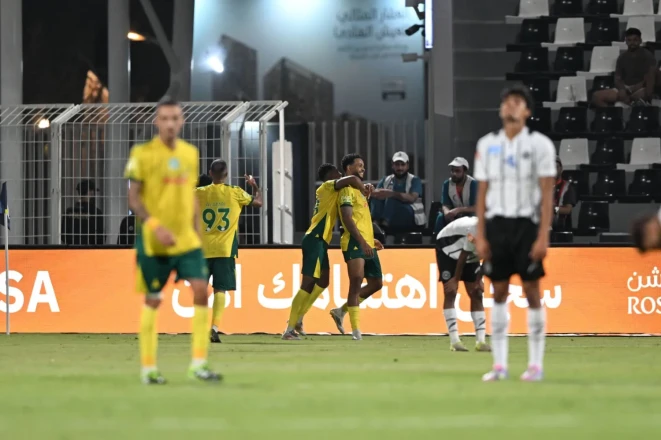
130 Million Riyals.. Will It Be the Lifeline for Al-Shabab Team?
The fans of Al-Shabab club experienced a tough night on August 29 after the team suffered a painful 4-0 defeat against Al-Khaleej in the opening of their Saudi league campaign, raising many questions about the club's summer and its delayed contracts.
The match revived many fears that had accumulated within the Al-Shabab camp, as former star Abdu Atif confirmed that the team has lost its identity and character, and that what happened was not a surprise but a natural result of delayed solutions.
For his part, Ahmed Atif chose to focus on the crisis of Belgian Yannick Carrasco, confirming that the recurrence of his problems has become an obstacle to any technical stability, placing the management in a complicated position in front of the angry fans.
The departure of Argentine Cristian Guanca at the beginning of July was only an additional reason for the widening offensive gap, as the club has not yet succeeded in compensating for his absence, which has narrowed the options for coach Al-Ghuwasil.
Despite this, the management breathed a sigh of relief after resolving the "registration ban" issue and settling previous disputes, returning to the transfer market at the last moment, amid intense anticipation from the team's supporters for what could be achieved.
On the financial front, the recent government support of injecting 130 million riyals represented a lifeline for the club; however, reports indicated that a large portion of the amount was directed towards settling existing obligations and deficits, which reduces the management's ability to make major deals.
With the transfer window closing in mid-September, Al-Shabab finds itself compelled to hurry in bringing in a replacement winger for Guanca, an additional striker, as well as a goalkeeper and a center-back, along with urgently resolving the Carrasco file that continues to stir controversy.
Today, the "Lions" stand at a critical juncture: either invest the funds wisely and quickly to reshape a competitive team, or continue in a cycle of crises that could place its entire season under the most challenging title in its recent history.
The match revived many fears that had accumulated within the Al-Shabab camp, as former star Abdu Atif confirmed that the team has lost its identity and character, and that what happened was not a surprise but a natural result of delayed solutions.
For his part, Ahmed Atif chose to focus on the crisis of Belgian Yannick Carrasco, confirming that the recurrence of his problems has become an obstacle to any technical stability, placing the management in a complicated position in front of the angry fans.
The departure of Argentine Cristian Guanca at the beginning of July was only an additional reason for the widening offensive gap, as the club has not yet succeeded in compensating for his absence, which has narrowed the options for coach Al-Ghuwasil.
Despite this, the management breathed a sigh of relief after resolving the "registration ban" issue and settling previous disputes, returning to the transfer market at the last moment, amid intense anticipation from the team's supporters for what could be achieved.
On the financial front, the recent government support of injecting 130 million riyals represented a lifeline for the club; however, reports indicated that a large portion of the amount was directed towards settling existing obligations and deficits, which reduces the management's ability to make major deals.
With the transfer window closing in mid-September, Al-Shabab finds itself compelled to hurry in bringing in a replacement winger for Guanca, an additional striker, as well as a goalkeeper and a center-back, along with urgently resolving the Carrasco file that continues to stir controversy.
Today, the "Lions" stand at a critical juncture: either invest the funds wisely and quickly to reshape a competitive team, or continue in a cycle of crises that could place its entire season under the most challenging title in its recent history.










